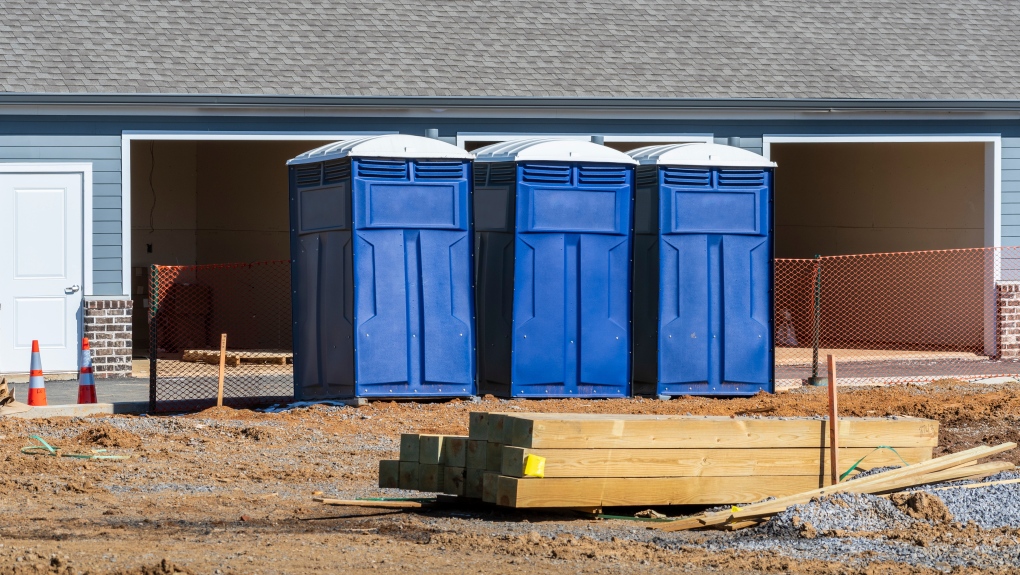No more porta-potties at B.C. construction sites starting Oct. 1
 Porta-potties are seen at a construction site in this image from Shutterstock.com
Porta-potties are seen at a construction site in this image from Shutterstock.com
What some B.C. construction workers describe as the worst aspect of their jobs will be coming to an end next month, the province announced.
Starting Oct. 1, construction sites with 25 workers or more will be required to have flushing toilets and hand-washing facilities, ending the reign of unsavory porta-potties.
“We all know how unpleasant port-a-potties can be, but this is actually a health-and-safety issue for construction workers,” said Labour Minister Harry Bains in a news release Thursday. “We have heard clearly from the building sector that it is an important issue for workers, and it contributes to the sector’s ability to attract and retain workers, including women.”
Premier David Eby first promised to address the washroom woes in the industry last October when speaking at the BC Building Trades Council, saying it was the union coalition’s advocacy that prompted the legislation.
According to Statistics Canada, more than 245,000 British Columbians work in the construction sector.
“I love my job, but one of the worst parts of going to work is facing the nasty conditions inside of construction-site port-a-potties,” said Tiffany Madden, a member of IBEW 213 and board member with Build TogetHER BC, in the release. “These new rules mean myself and my colleagues will be treated with the basic dignity of having flushing toilets with running water, something workers in most other industries take for granted.”
The province says the changes fall under the Occupational Health and Safety Regulation and WorkSafeBC is responsible for ensuring construction companies comply, beginning with making them aware of the changes over the next few months.
The new rules require toilets that can be connected to a sewer system or holding tank and use a flow of clean water. Washrooms will also require hand-washing facilities with soap and water and must be clean, ventilated and private.
“WorkSafeBC’s guidelines will allow for flexibility if flush toilets are not practicable. However, the onus will be on the employer to provide a rationale and evidence for being unable to provide these facilities,” the province wrote.
CTVNews.ca Top Stories

Mark Carney tells Jon Stewart the Liberal party has 'a chance' after Trudeau's resignation
Days ahead of his expected Liberal leadership campaign launch, former Bank of Canada and Bank of England governor Mark Carney says Prime Minister Justin Trudeau's decision to step down boosts the party's chance in the next general election.
Harm reduction advocates hope high court will 'clarify' Canada's 'Good Samaritan' law
Canada's Good Samaritan law, which is meant to shield people from arrest after they seek help for someone in medical distress, is under spotlight in the Supreme Court of Canada.
'We can live our lives again without worrying': Ontario man relieved after insurance company agrees to pay $620,000 hospital bill
An Ontario man who received a $620,000 medical bill from a Florida hospital is now relieved that his insurance company has reversed its decision and decided to pay the bill.
Queen Elizabeth II wasn't told about Soviet spy in her palace, declassified MI5 files show
Queen Elizabeth II wasn’t told details of her long-time art adviser's double life as a Soviet spy because palace officials didn’t want to add to her worries, newly declassified documents reveal.
Strong winds forecast for Los Angeles threaten area's fight against fires
Additional water tankers and scores of firefighters have arrived at the Los Angeles area ahead of fierce winds that were forecast to return and threaten the progress made so far on two massive infernos that have destroyed thousands of homes and killed at least 24 people.
Hamas has accepted a draft agreement for a Gaza ceasefire and the release of hostages, officials say
Hamas has accepted a draft agreement for a ceasefire in the Gaza Strip and the release of dozens of hostages, two officials involved in the talks said Tuesday. Mediator Qatar said the negotiations were at the “closest point” yet to sealing a deal.
Kate Middleton, Princess of Wales, visits hospital where she had cancer treatment
Kate, Princess of Wales, visited a London hospital on Tuesday where she underwent cancer treatment last year to personally thank medics there for their care and support, her office said.
Icelandic discount carrier Play Airlines pulls out of Canada, leaving customers in dark
Play Airlines is pulling out of Canada less than two years after entering the market.
Industry minister Champagne to announce Liberal leadership intentions today
Industry Minister Francois-Philippe Champagne plans to reveal his intentions for the Liberal leadership race today.
































